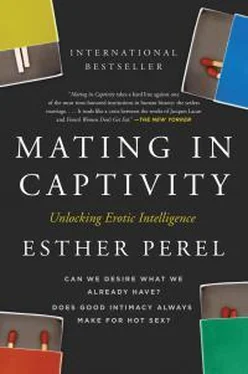All these meanderings on intimacy are still far from the awareness of John and Beatrice. The authenticity and the spontaneity of the beginning did not lead them to anticipate the ambivalence of love that would follow. From where they were, intimacy was simple. Open up, reveal, share, become transparent, open up more…
John and Beatrice exemplify a typical beginning. In fact, the intense physical and emotional fusion they experience is possible only with someone we don’t yet know. At this early stage merging and surrendering are relatively safe, because the boundaries between the two people are still externally defined. John and Beatrice are new to each other. And while they are migrating into each other’s respective worlds, they have not yet taken full residence; they are still two distinct entities. It is all the space between them that allows them to imagine no space at all. They are still enthralled by the encounter, and they have not yet consolidated their relationship.
In the beginning you can focus on the connection because the psychological distance is already there; it’s a part of the structure. Otherness is a fact. You don’t need to cultivate separateness in the early stages of falling in love; you still are separate. You aim to overcome that separateness. As new lovers, John and Beatrice enjoyed a built-in distance that allowed them to experience the confluence of love and desire freely, exempt from the conflicts they would bring to therapy later.
Entrapment Deadens Desire
For John, intimacy harbors a threat of entrapment. He grew up in a home with an alcoholic, abusive father. He can’t remember a time when he wasn’t acutely attuned to both his father’s moods and his mother’s sadness. As a young boy he was recruited to be his mother’s emotional caretaker, and to alleviate her loneliness. He was her hope, her solace, a vicarious affirmation that her miserable life would be vindicated through her marvelous son. Children of such conflicted marriages are often enlisted to protect the vulnerable parent. John has never doubted his mother’s deep love for him; nor has the love ever been without a sense of burden. From early on, love implied responsibility and obligation. And even while he craves the closeness of intimacy—he has always had a woman in his life—he doesn’t know how to experience love in a way that does not feel confining. The emerging love he feels for Beatrice carries with it the same heaviness that love has always had for him.
There are many circumstances that can lead people to experience love and intimacy as constricting—an unhappy childhood is not a prerequisite. Popular love talk has made a real case for thinking of this as a “fear of intimacy,” which is seen as afflicting men in particular. But what I observe is not so much a reluctance to engage in intimate bonding—no one can doubt John’s deep involvement with Beatrice. Rather it is the weightiness of that involvement that these people find overbearing. Foreclosing the necessary freedom and spontaneity that eros demands, they feel trapped by intimacy.
John’s sexual inhibitions are exacerbated as his emotional involvement with his girlfriend deepens. As a matter of fact, the more he cares about her, the less he can freely lust after her. For him, as for many other men in this predicament, erotic shutdown is not subtle. He is at the mercy of a stubborn penis that simply will not respond. But why? What is the erotic block that stops him from pursuing pleasure with Beatrice, the same woman with whom he lay in a languorous paradise not so long ago?
Ironically, even the closeness generated by good sex can have a boomerang effect. Like John and Beatrice, many couples experience their relationship as a dance in which great sex brings them close, but then this very closeness can make sex difficult again. The initial rapture facilitates a swift bonding and establishes an immediate connection. But while many of us relish the idea of losing ourselves in sex, the very oneness that we experience through the merging of our bodies can evoke a sense of obliteration. The intensity of sexual passion triggers a fear of engulfment. Of course, few of us are aware of these undercurrents as they’re happening. What we feel instead is the urge to pull out right after orgasm, or the sudden desire to make a sandwich, to light a cigarette. We welcome the intrusion of any random thought: I meant to send an e-mail to…These windows need cleaning…. I wonder how my friend Jack is doing? We appreciate being left alone to meander leisurely in our own mind because this reestablishes a psychological distance, a delineation of the boundaries between me and you. From “inter-” we go back to “intra-.” Having been all over each other, we retreat back into our own skin. Nowhere is the passage from connection to separateness represented more clearly than at the end of a sexual act.
In his book Arousal , the psychoanalyst Michael Bader offers another explanation for John and Beatrice’s erotic impasse. In his view, intimacy comes with a growing concern for the well-being of the other person, which includes a fear of hurting her. But sexual excitement requires the capacity not to worry, and the pursuit of pleasure demands a degree of selfishness. Some people can’t allow themselves this selfishness, because they’re too absorbed with the well-being of the beloved. This emotional configuration is reminiscent of how John felt toward his mother—his awareness of her unhappiness overwhelmed him with worry and a sense of burden. The very caring he experiences makes it harder for him to focus on his own needs, to feel spontaneous, sexually alive, and carefree.
John has faced this vexing problem of loss of desire in every intimate relationship he’s been in. In the past, every time the block set in he interpreted it as meaning that he no longer loved the woman. In fact, the contrary is true. It is because he loves her so much that he carries this sense of responsibility for her and can’t enjoy the blithe quest for erotic rapture.
Patterns Are Equal Employment Opportunities
Dynamics in relationships are always complementary—both partners contribute to creating patterns. We can’t talk about John’s fear of entrapment and his diminishing desire without also taking a look at what Beatrice brings to the relationship. So I invite her to come in with John for a few sessions. In the course of our conversation her contribution to the puzzle becomes clear. In her coupling fervor, she has matched her interests to his, given up most activities that don’t include him, and stopped seeing her friends. Unfortunately, all her attempts to increase the closeness between them have had the opposite effect erotically. Her eagerness to please and her constant readiness to give up anything that might come between them increases the emotional burden and further exacerbates his sexual withdrawal. It’s as if his penis is creating a boundary that he cannot establish otherwise. It’s hard to feel attracted to someone who has abandoned her sense of autonomy. Maybe he can love her, but it’s clearly much harder for him to desire her. There’s no tension.
I suggested that Beatrice move out of their joint living situation for a while, and reestablish some independence. Doing this encouraged her to reconnect with her friends and to stop organizing her life around John. As I said to her, “You’re so afraid to lose him that you’ve alienated yourself and you’ve lost your freedom. There isn’t a separate person here for him to love.” To John I said, “You are such a caregiver that you can no longer be a lover. We need to reestablish a degree of differentiation and re-create some of the distance you had in the beginning. It’s hard to experience desire when you’re weighted down by concern.”
Читать дальше










